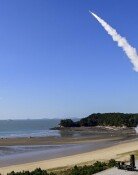Ten Months After the Implementation of the Korea-Chile FTA
Ten Months After the Implementation of the Korea-Chile FTA
Posted January. 30, 2005 22:51,
Since the implementation of the Korea-Chile Free Trade Agreement (FTA) in April 2004, trade volume between the two countries until recently has largely increased, and the surge of Chilean imported agricultural products, which was a matter of concern, did not occur.
Accordingly, it is predicted that the package for FTA negotiations that the government will pursue will be simultaneously accelerated.
In particular, the government will be able to more flexibly deal with domestic agricultural market openings in various kinds of international trade negotiations.
According to the Korea Customs Service on January 30, Koreas export volume to Chile recorded $709 million and the amount of Chilean imports was about $1.9 billion, showing the highest figures in history.
Exports showed a consecutive decrease in 2001 and 2002 by $450 million from $593 million in 2000 and increased by $500 million in 2003.
Imports exceeded $900 million in 2000 and fell by $690 million in 2001, but imports are tending upwards from $709 million in 2002 to $1.6 billion in 2003.
In particular, before the official implementation of the FTA between Korea and Chile in January through March 2004, the average monthly exports were $45 million, but the exports recorded $64 million, which increased by more than 40 percent after the implementation of the bilateral FTA.
The main reason is that exports in the electronics and automotive sector showed a favorable tendency in exports thanks to the tariff elimination right after the implementation of the FTA.
The increase in imports can be interpreted that more than 80 percent of Chilean imports consist of copper and related products, and the unit price of imported crude copper has skyrocketed due to the worldwide sharp rise in prices of raw materials.
In addition, another reason for the sharp increase in imports is that companies changed their import partners of crude copper and related products from Indonesia to Chile since the implementation of the bilateral FTA.
Agricultural imports increased by 24 percent last year, showing a similar tendency to an increasing range (20 percent) on the total agricultural imports.
Particularly, the amount of imports of Chilean grapes and peaches, which were a matter of concern due to the effectuation of the Korea-Chile FTA, decreased, or Chilean grapes and peaches were not imported at all.
Director Kim Ki-young of the Korea Customs Service analyzed this, saying that tariffs on Chilean agricultural products will be eliminated over the decade, and the increase in imports in accordance with the implementation of the Korea-Chile FTA will not be that serious because Chilean agricultural products take up only one percent of total imported agricultural products.
Park Ji-hyun, a professional researcher of the Korea Institute for International Economic Policy (KIEP) forecasted that trade volume among products with tariffs to be eliminated immediately under the Korea-Chile FTA has been increasing. The trade creation effect or trade expansion effect in accordance with the conclusion of the FTA will be expanded more and more.
Jae-Seong Hwang jsonhng@donga.com







